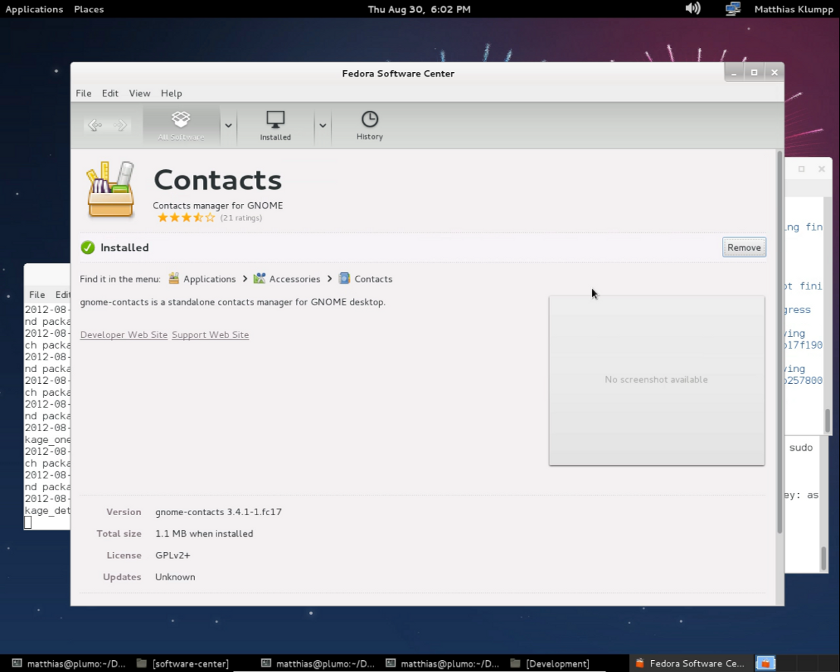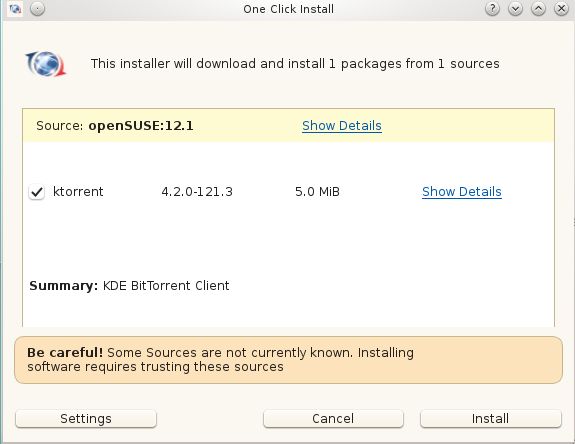Report: Successful openSUSE GSOC
28. Sep 2012 | News Team | No License
This summer, openSUSE had a great experience for the fifth time participating in the Summer of Code. While working on the list of ideas for GSoC projects, we decided to encourage students to apply not only for openSUSE-specific projects, but also for projects that would be useful to our upstreams and to other distributions. We love working with other organizations, and that is why we always try to push for more collaboration.
Nine of our students successfully completed their projects, and we’d like to share what they’ve done.
Beautiful 1-Click Install, by Saurabh Sood
One of openSUSE’s features is the “one click installer”, which allows a user to go tosoftware.opensuse.org, select a package they want to install, click on a link, and then an installer is launched that handles all of the package dependency issues. Up until this summer, the installer wasn’t very visually appealing. Saurabh made a great deal of progress, as you can see in some of the screenshots on his weblog, and we’re all looking forward to getting it into the main distribution.
[caption id=”attachment_14167” align=”alignright” width=”300”] Software Center on Fedora[/caption]
Software Center on Fedora[/caption]
Complete AppStream/Software-Center, by Matthias Klumpp
Matthias tackled the challenge of making the PackageKit-based software center work nicely on several distributions. He quickly found out that PackageKit needed some tuning. The project therefore became more focus on PackageKit than on the Software Center: Matthias improved performance of PackageKit, in big part thanks to the new support for parallel transactions he implemented and to backend API changes. He also made fixes and improvements to the software center itself, which is now super fast and work better on non-Ubuntu distributions. On top of that, anew library to handle the appstream metadata (describe applications) was created during GSoC, and will be used by several other projects. More work will keep happening after GSoC.
Read Matthias’ final report.
openSUSE Karma plugin for openSUSE Connect, by Priyanka M
openSUSE has a social network called “Connect”. This summer, Priyanka wrote a karma plugin that functions similar to StackOverflow’s reputation system. openSUSE users get karma points for things like Bugzilla activity, or promoting openSUSE in social media.
osc2 client, by Marcus Hüwe
The Open Build Service is a service that openSUSE provides to allow people to easily build packages for a variety of distributions like openSUSE, SLES, Fedora, and Ubuntu. The command line client for interacting with this service is osc. This summer, Marcus continued his previous GSoC work on the second version of the client.
Popularity Contest for RPM (popcorn), by Akshit Khurana
Popcorn is inspired by Debian’s “popcon”, a system of (voluntarily!) tracking how popular packages are in the install base, which is very useful information for a distro. Akshit spent his summer improving it.
Redesign fdisk to be more extensible and implement GPT support, by Davidlohr Bueso
Davidlohr worked upstream on refactoring and modernising fdisk. He managed to clean up and modularize a lot of complicated fdisk code, which will make it easier in the future to support more disklabels and add more functionality, as well as creating planned libfdisk library. Davidlohr also submitted a patch which implements basic support for the GPT disk label.
[caption id=”attachment_14168” align=”alignright” width=”300”] One Click Install while still work in progress[/caption]
One Click Install while still work in progress[/caption]
Scanny, by Piotr Niełacny
Scanny is a Ruby on Rails security scanner, which parses Ruby files, looks for suspicious patterns, and produces a report. Piotr added new security checks (mostly based on checks in the older Perl-based scanner). He also designed and implemented a proper command-line interface and tested the project on several real-world applications, which led to various performance gains and other improvements.
Upstream/Downstream Tracker, by N.B. Prashanth
Distributions usually have tools for tracking new versions upstream, but the existing tools are all pretty much limited to one distribution, and have some limitations. The goal for this project was to take some existing work done for openSUSE, and turn it into the backend of a more complete system. A rails web application was also created to be able to see the upstream versions, as well as to administrate the packages to be tracked.
Writable snapshot support for ext4, by Yongqiang Yang
Yongqiang worked on adding writable snapshot support to ext4. The writable snapshot features now work, but they need some testing from the wider community as well as integration into distributions. The code written during the project is available here, and people can test it with packages from theOpen Build Service repository.
The end - and soon a new start!
It has been an exciting summer for all of us, students, mentors and administrators, and the openSUSE community. We will greatly benefit from the results of those projects, and we do hope the larger free software community will also enjoy what our wonderful students produced. Many thanks to Google for organizing GSoC, and we look forward to another Summer of Code next year!
Categories: Google Summer of Code
Tags: